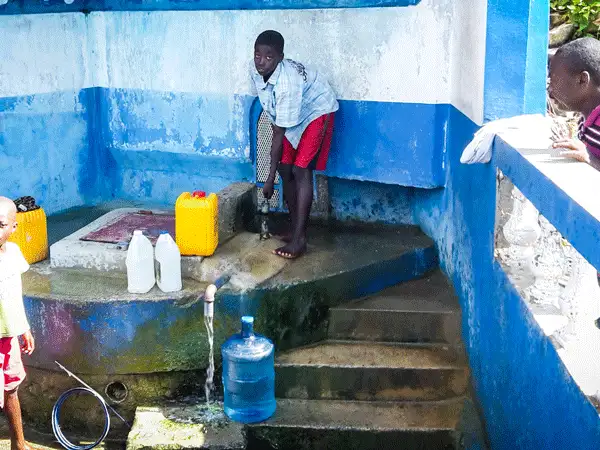

Young children collecting water from a broken pump in Bariadel, Haiti.
On 3 October, Hurricane Matthew devastated Haiti, killing more than 1,000 and displacing hundreds of thousands people who are now living in temporary shelters such as schools.
1.4 million people have been affected overall leaving many people without access to essentials such as water and adequate hygiene and sanitation facilities.
CAFOD has been supporting sister agency Catholic Relief Services (CRS) with their hygiene and sanitation emergency response in two of the most affected areas - Sud and Grande Anse - where up to 70% of the population are in need of humanitarian aid.
Factbox 1
A devastating magnitude-7.2 earthquake struck Haiti on Saturday 14 August 2021. As the search continues through the rubble, we are working with local Church organisations to provide urgent humanitarian aid for families.
In addition to providing access to clean water and promoting safe hygiene practices, CAFOD are also supporting CRS to repair clean water sources - such as wells and water pumps - as well as building latrines for households, schools and clinics.
Hurricane Matthew devastated some of Haiti's remotest areas in the Sud and Grande Anse departments. People rely on agriculture and fishing for their livelihoods and the lack of clean water, as a result of the Hurricane, is putting their lives at risk.
Help us to be there when emergencies happen. Please give to our emergency response fund
Our Senior Emergency Response Officer, Robert Cruickshank, who visited Haiti in the wake of Hurricane Matthew, said:
"There are few opportunities to make a living; to suffer the storm damage that some families have sustained, is a hard thing to recover from.
"These are remote communities that depend on agriculture and fishing; they've had the 'guts' ripped out of them."
Hygiene promotion in the communities is vital to stopping the spread of the deadly disease Cholera. Already in Sud and Grand Anse more than 1,100 cases of cholera have been recorded.
"When you've been stripped of the basics of life, and you are only left with debris around you, it is incredibly difficult to lead an even moderately hygienic life”, said Mr Cruickshank.
"Cholera can kill you quickly - losing fluids from your body is followed swiftly by organ failure if you are not treated promptly. Although easily treatable, if not contained it spreads very quickly attacking the strong as well as the weak."
Cruickshank continued:
"The country was trying to bring cholera under control after the earthquake in 2010; there is now an upsurge in cholera amongst communities, since Hurricane Matthew and the challenge is to bring it under control and have proper treatment in place."
Please continue to pray for the people of Haiti.
Help us to be there when emergencies happen. Please give to our emergency response fund

